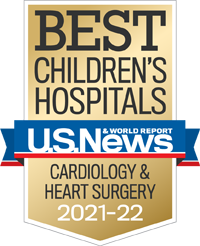Pediatric Cardiology Conditions Treated

Heart conditions can develop before a baby is born and need special care throughout childhood and sometimes into adulthood.
The pediatric cardiology team at the University of Maryland Children's Hospital provides the most sophisticated level of care to children with cardiac conditions ranging from rhythm abnormalities to the most complex heart surgeries.
The entire pediatric cardiology team is comprised of experts who specialize only in children with heart conditions and who understand their complications and what is necessary, including pediatric heart surgery, to provide the best outcomes.
Acquired Heart Disease
Acquired heart diseases develop over the course of a person's life. While more common in adults, these can still affect children. Children with congenital heart diseases are more at risk for developing an acquired heart disease. Examples of acquired heart diseases include:
- Cardiac Tumors
- Cardiomyopathies
- Endocarditis
- High Blood Pressure (Hypertension)
- Pericarditis/Pericardial Effusion
- Pulmonary Hypertension
- Rheumatic Heart Disease
Cardiomyopathies
A cardiomyopathy is when the heart muscle doesn't properly circulate blood throughout the body. It can lead to heart failure and may require a heart transplant.
The main types are dilated cardiomyopathy, restrictive cardiomyopathy, and hypertrophic cardiomyopathy, which is associated with sudden death in athletes.
Arrhythmias
An arrhythmia is when the heart beats out of rhythm, either too fast, or too slowly. Examples include:
- Atrioventricular/heart block
- Long QT syndrome
- Supraventricular tachycardia (SVT)
- Ventricular tachycardia (VT)
Congenital Heart Disease
Congenital heart disease is one of the most common issues present at birth. These include holes in the heart and also issues like arteries which grow in the wrong place.
Learn more about different kinds of congenital heart disease.

